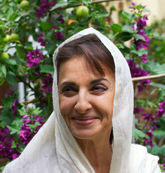Public Discourse & Spirituality
with Fawzia al-Rawi

ABOUT THIS COURSE:
Taught in three segments, this course will explore what it means to engage in discourse in times of crisis and tense civic division. This course will be recorded, and the recordings will be made available to all who register. The lectures will cover:
Civic Tension and Spirituality
We will discuss solutions to the following dilemnas:
What does it mean to be a Sufi in times of change and crises?
How do I bring balance between my inner path of love and unity and the outer diversity of life?
What is the meaning of justice and what is more important justice or mercy?
What does it mean to be in the world but not from the world?
One of the essentiell qualities of love is tolerance. Tolerance is fineness of the heart. But does tolerance give us the capacity of accepting intolerance?
Is globalisation a movement that helps in solving our difficulties with each other?
In a world of constant change and movement, where do I find my values and how can I distinguish between what is necessary and what is distracting, what is worth doing and where shall I let go?
The Blossoms of the Quran
In the Holy Quran there is no continuity in actions, no chronology in the stories, the Quran does not deal with life stories nor with history, time stands still.
Yet we find stories after stories, speeches and reply, prayers and warnings, memories and dreams, wisdom and standardize moving together intermingling and opening.
We will examine the following:
How can I approach and read the Quran to get a deeper understanding of its guidance?
What does the Quran tell us about women, youth and homosexuality?
What does the Quran tell us how to deal with other believes and religions?
What are the basic matrixes of the Quran?
Healing with the Divine Names and Qualities
Our spine is like a landscape that give us an insight into our inner process. Learn to read your spine, and gain understanding our emphasis in life and what is emotionally important to us.
We will explore how stress, worries, and our longings show themselves in the spine.
We will consider:
What does the Quran tell us about our spine?
How can we use the Divine Names and qualities to support our spine and inner transformation?

ABOUT THE INSTRUCTOR:

Dr. Rosina-Fawzia Al-Rawi was born in Baghdad and spent her childhood in Iraq and Lebanon. Her grandmother initiated her into the culture and traditions of the Middle East where belly-dancing played a major part as an expression of the world of the feminine. She holds a PhD in Islamic studies. She completed her Arabic, Islamic and ethnological studies at the Universities of Vienna and Cairo. She then spent 12 years in Jerusalem where she brought up her children and worked at the Institute for the Promotion of Palestinian Agriculture and at the University of Jerusalem, while deepening both her theoretical and practical knowledge of Sufism under the guidance of Sidi Shaykh Muhammad Al-Jamal. She has been living in Vienna with her husband and their three children since 2001. She has been teaching Sufism for over 20 years. She holds workshops in various countries and works particularly with women.

Cover Photo by Michal Lomza on Unsplash, art by Casey Twining


